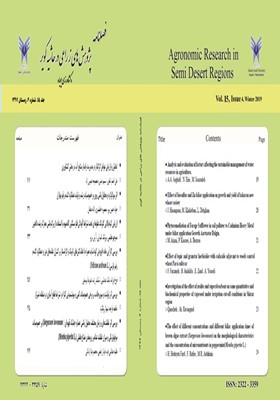تحلیل و ارزیابی عوامل اثرگذار در مدیریت پایدار منابع آب در بخش کشاورزی
محورهای موضوعی : پژوهش های زراعی در حاشیه کویرعلی اصغر ثقفی 1 , نسیم عینی 2 * , معصومه عیسی زاده 3
1 - گروه ترویج وآموزش کشاورزی، دانشگاه آزاد اسلامی بیرجند. بیرجند –ایران.
2 - گروه بیوتکنولوژی کشاورزی دانشگاه پیام نور استان البرز واحد کرج. کرج- ایران
3 - گروه باغبانی گرایش فناوری گیاهان دارویی و معطر دانشگاه جامع علمی کاربردی مرکز آموزش جامعه گیاه درمانی ایران
کلید واژه: آب, کشاورزی, اکوسیستم, اقلیم و مدیریت,
چکیده مقاله :
آبگرانبها ترین ثروتی است که دراختیار بشرقرارگرفته،به خصوص درایران،که سطح وسیعی ازآنرامناطق خشک وکویریدربرگرفته است.باتوجه به اقلیم خشک وشکننده کشوروبادرنظرگرفتن خشکسالی های اخیراهمیت آب به عنوان یک نهاده حیاتی بیش ازپیش مشخص می شود. امروزه بشر در جریان شتابان توسعه برای تامین آب با مشکلات زیادی روبرو است. این وضعیت در اقلیم های خشک کم بارش که اکوسیستم های دخیل در تامـین آب شکننده تر است با وقوع خـشکسالی ها و برداشت بی رویه از ذخایر آب، برنامه ریزان را با شرایط بحرانی تر روبرو ساخته است. محدودیت منابع آبی، رشد سریع جمعیت و نیاز به تولید بیشتر، سبب شده است که بخش کشاورزی نسبت به سایر بخش های مصرف کننده آب، تقاضای بیشتری برای مصرف داشته باشد. بنابراین، مهم ترین چالـش بخش کشاورزی این مناطق در شرایط کنونی چگونگی تولید بیشتر غذا از آب کمتر است.نتایج نشان می دهد که بخش آب یکی از بخش های زیر بنایی و اساسی کشور می باشد که می تواند به عنوان موتور رشد در اقتصاد عمل کند و باعث رشـد سایر بخش ها به خصوص بخـش کشاورزی و فعالیت های وابـسته به آن گردد و همچنین نتایج نشان داد که رابطه معنی داری بین ویژگی های فردی کشاورزان و تمایل به مدیرت پایدار منابع آبی وجود دارد. تحقیق حاضر از نوع تحقیقات کاربردی و به روش توصیفی و همبستگی بودو از تکنیک تحلیل عاملی استفاده نمود. این تحقیق به شیوه اسنادی و میدانی و با استفاده از پرسشنامه برای تعیین عوامل موثر بر مدیریت پایدار منابع آب زراعی در زمین های کشاورزی اطراف تهران انجام شد. جامعه آماری در این تحقیق تمامی مدیران، کارشناسان و صاحبنظران بخش کشاورزی اطراف شهر تهران بود. پس از مطالعه کتابخانه ای و میدانی، اطلاعات جمع آوری و سپس اطلاعات به دست آمده با استفاده از نرم افزار SPSS مورد تجزیه و تحلیل قرار گرفت.
Water is the most precious wealth available to mankind, especially in Iran, a large area of which is covered by arid and desert areas. Due to the dry and fragile climate of the country and considering the recent droughts, the importance of water as a vital input is becoming more and more clear. Today, human beings are facing many problems in the process of accelerating development to supply water. This is the case in arid climates where ecosystems involved in water supply are more fragile. With droughts and uncontrolled depletion of water resources, it has put planners in a more critical position. Limited water resources, rapid population growth and the need for more production have made the agricultural sector more in demand than other water-consuming sectors. Therefore, the most important challenge for the agricultural sector in these areas in the current situation is how to produce more food than less water. The results show that the water sector is one of the basic infrastructure sectors of the country that can act as an engine of growth in the economy and cause the growth of other sectors, especially the agricultural sector and related activities. Also the results showed that there is a significant relationship between individual characteristics of farmers and the desire for sustainable management of water resources. The present study was an applied research by descriptive and correlation methods and used factor analysis technique. This research was conducted by documentary and field methods using a questionnaire to determine the factors affecting the sustainable management of agricultural water resources in agricultural lands around Tehran. The statistical population in this study was all managers, experts and experts in the agricultural sector around the city of Tehran. After library and field study, were collected data and then they obtained information was analyzed using SPSS software.
_||_

